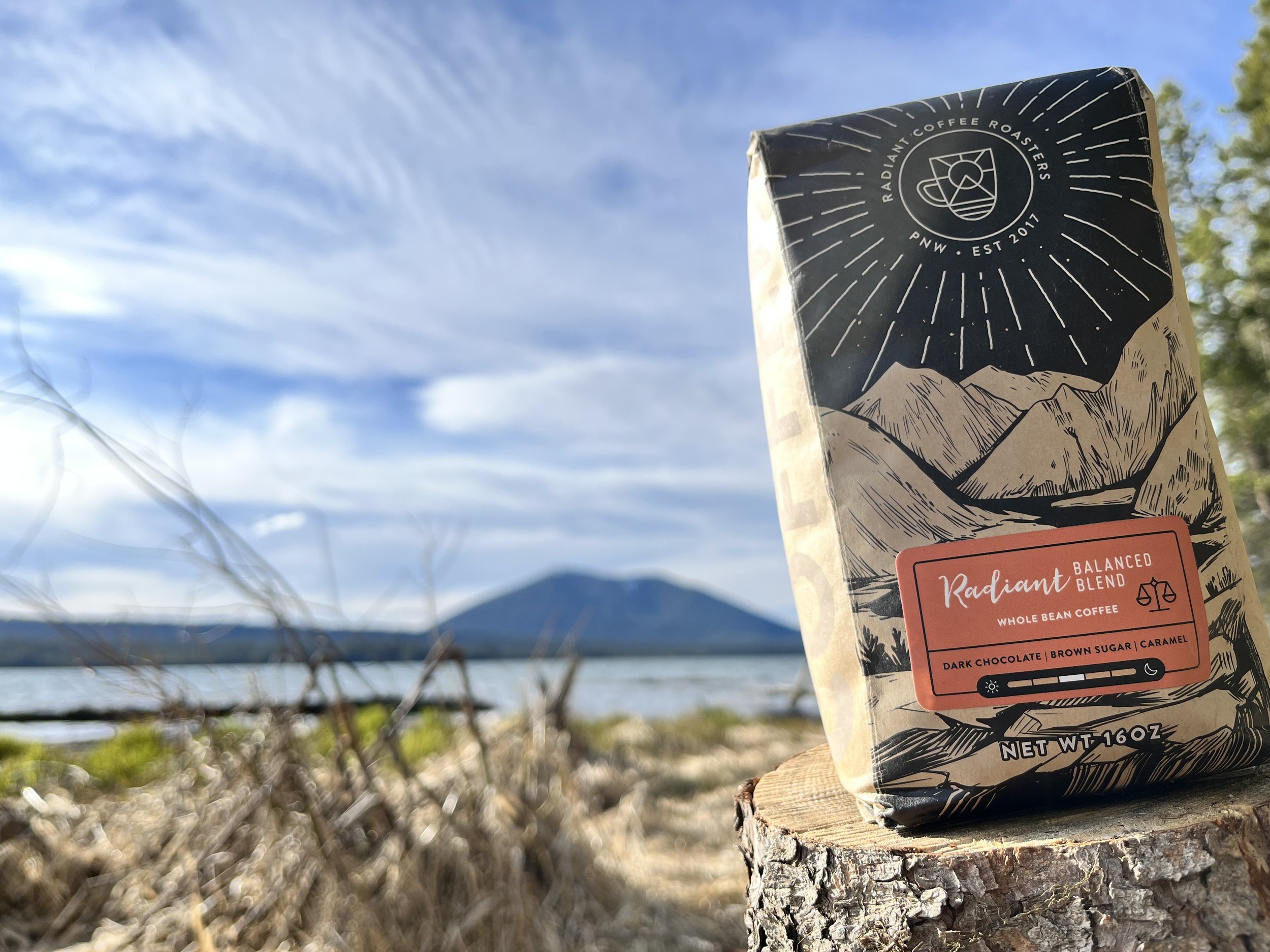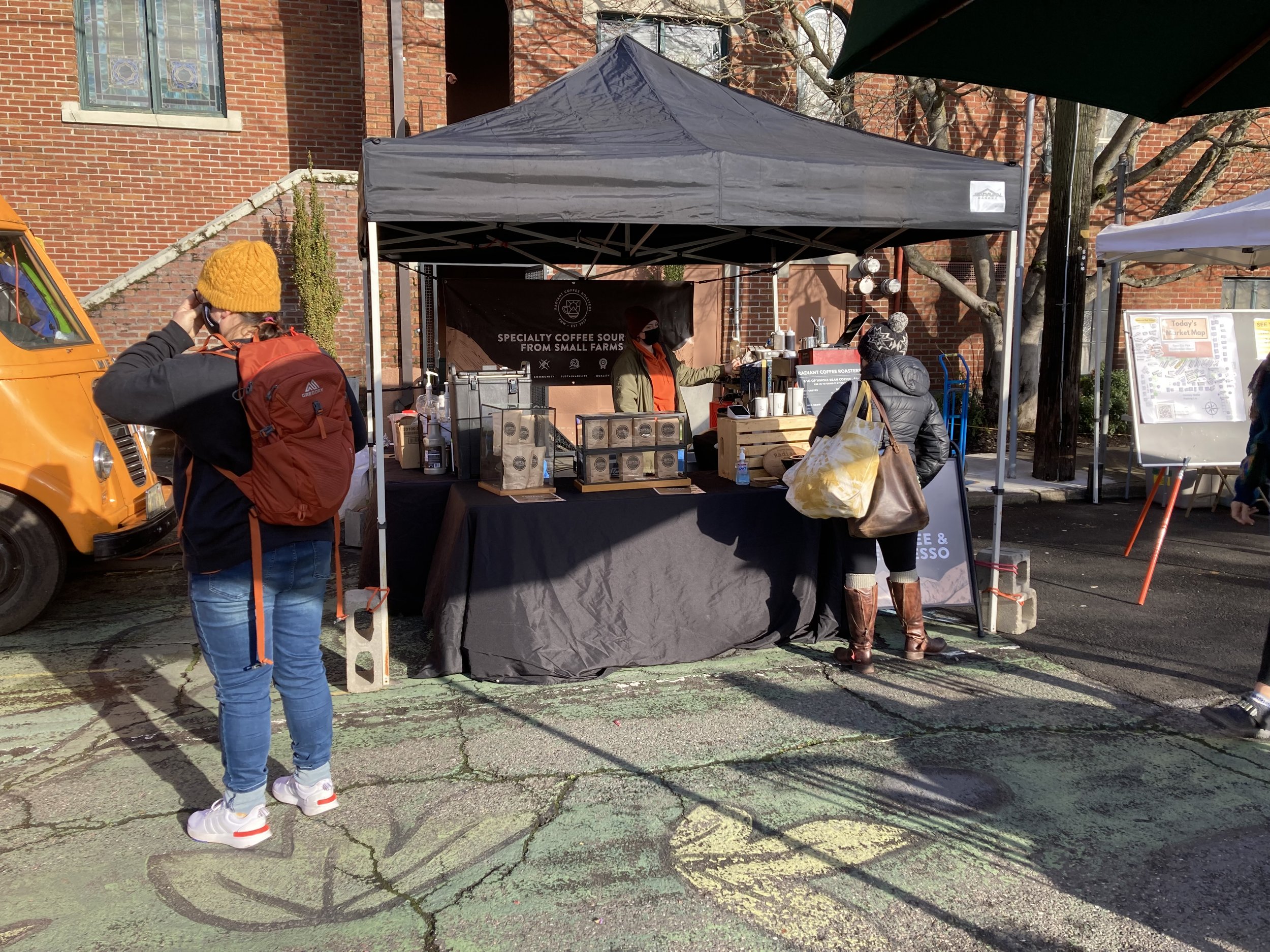Road to Radiance
ROAD TO RADIANCE
Olivia Spitzer
What do you get when you combine a popcorn popper, a lavender farm, a man on the move? This isn’t a riddle – it’s the road of twists and turns that lead Alex Newton to success with his business, Radiant Coffee Roasters.
“I started roasting coffee in 2015. I got a little popcorn popper from goodwill. I had no intentions of starting a business, it was just a hobby.” Newton is remarkably open when talking about the beginnings of Radiant Coffee Roasters. He has no qualms addressing the moments of doubt or acknowledging the ways his small choices somehow lead to big consequences. “I was delivering sandwiches on my bike. I didn’t know what I wanted to do. I toyed around with the idea of being a wildlife biologist, a park ranger.” Newton knew he wanted to be outdoors so decided to try his hand at WWOOFing. “It was my first introduction to farming and the communities around farms.”
WWOOF stands for World Wide Opportunities on Organic Farms - an organization that connects individuals with farms seeking labor in exchange for housing. “I had never thought about farming. I was traveling and it was a way to have somewhere to stay. I went from Arizona to Montana and worked on a lavender farm.” Newton appreciated the way farming combined many of his interests.
When he landed in the pacific northwest, Newton signed up to participate in Camas Swale Farm workshare program. In exchange for hours helping on the farm, Newton received a CSA share. “That was my first interaction with on-the-ground, ‘we are selling tomatoes to pay our mortgage’ farmers. They’re hard-working people.” He felt inspired. He wanted to find a way to be a bigger part of a farm, to be immersed in this community and surrounded by these people. “I saw what it took – fifteen years of waking up every single day at 6am – I’d never seen commitment like that.”
And all the while, he kept roasting. Eventually it came time to upgrade from the popcorn popper. “I spent the last of my money on a hand-built roaster from this guy out of Taiwan. You just emailed him - he didn’t have a website or anything. It resembled a commercial roaster because you could have more control over the roast.” Newton was in his early twenties, and this is what he had: the ability to roast one pound of coffee beans at a time, and interest in farming. Looking back, he reflects on his wild trust-fall of a purchase from across the globe. “That was the roaster I started my business on.”
The catalyst moment for Radiant Coffee Roasters was when Newton began to work for Deck Family Farm. “They were very critical in me starting the business,” he recalls. Newton’s new job was working farmers’ markets. Suddenly, at markets, the pieces started to come together for him: coffee, shoppers, farmers. “All of this was springing from the farm, from the farmers’ market community. [I thought,] I’m going to sell coffee to my farm friends.”
Newton first started to sell his coffee through Deck’s CSA program – coffee he roasted, bagged, and stamped in his living room. People liked what he had. Demand grew. He began to bring bags of coffee with him to market. He was eventually offered his own booth, which represented a huge leap forward from just selling his coffee as a part of Deck’s offerings. But he couldn’t make this jump alone. “Deck was excited for me, and [they] wanted to work with me to do [it]. They were critical in helping me with logistics for my first market season - assisting with all of this was stuff that was [otherwise] out of my reach.” He is genuine and animated when he talks about this time with Deck, clearly grateful for the way this small family farm chose to act as an informal incubator for his business.
One farmers’ market led to more, which led to a commercial space, a larger roaster, bigger orders, wholesale accounts, and bringing on employees. “Every month for two years it was, ‘is this sustainable? Can I keep doing this?’ I just said yes to every single opportunity I could.”
Cut to 2023, and Radiant Coffee Roasters is thriving. “[Hillsdale is] the type of market I want to invest in and be a part of. We love showing up and even when you’re out there on a bad day, you know you’re all out there together. If you’re part of a community [and] you don’t question if you want to be there, then it’s worth it.”
When you think of coffee roasting, you might not immediately imagine a road that begins with farming. But for Newton, it is all intertwined. “A lot of my desire to have a business still comes from the small farm world. It was the idea that we could come together as a team and we could do better. The vegetables at farmers market are just better.”
Even though he is based in a city with such a serious coffee scene, Newton doesn’t get distracted by what his competitors are doing. He knows his business model will remain tied to farmers’ markets. When you dive into the Portland coffee industry, he explains, “you get pushed to be a ‘high end’ [product] because the margins are better. Our goal is to keep it reasonable. People come [to the market] for the untouchable quality of vegetables. They just want good coffee at a reasonable price. I don’t want to sell farmers $40/lb coffee.” He appreciates Radiant’s role in the farmers’ market eco-system. “I feel like support for the market – for the small farms. This is a lot of work. It doesn’t work without the people. You have to care.”
You can find Alex Newton and Radiant Coffee Roasters at Hillsdale every Sunday, from 9am – 1pm.


